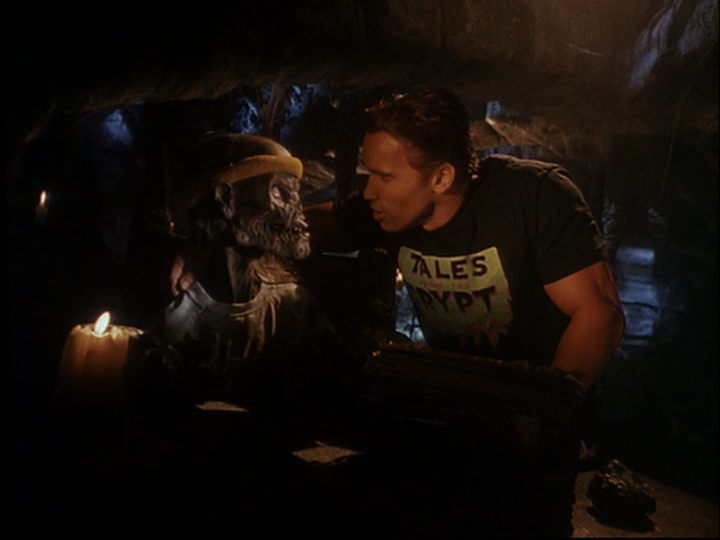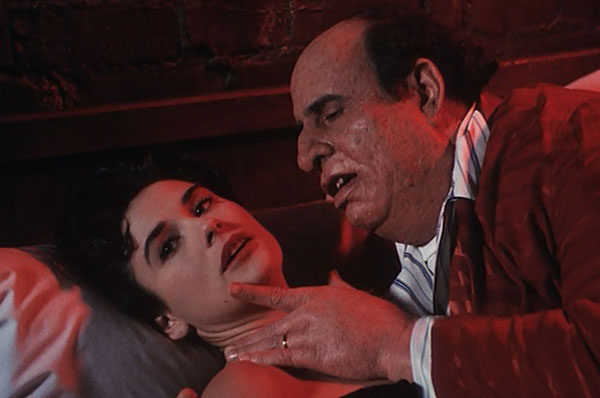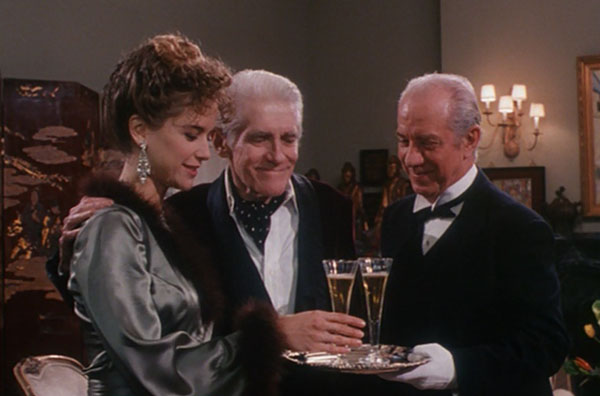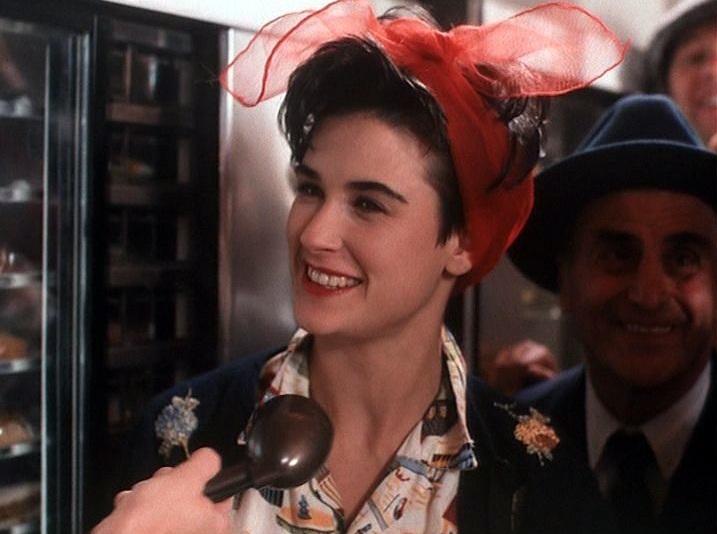Join John Cribbs on a journey through the full run of HBO's early 90's horror anthology Tales from the Crypt. You might expect us to make a series of Crypt Keeper inspired puns here in our intro, but c'mon we can't compete with that guy. Instead, we'll simply say that there's no grand idea behind these episode-by-episode recaps, they were prompted by Cribbs' interest in delving into a series that he was not intimately familiar with in his youth.
In addition to being laden with heavy-hitters distinctly of the era like Demi Moore, Arnold Schwarzenegger and Robert Zemeckis, Tales from the Crypt features numerous Pink Smoke favorites like filmmakers Walter Hill, Rodman Flender, Steven E. DeSouza and Tobe Hooper as well as a wide variety of the kind of character actors that we love: William Sadler, Michael Ironside, Lance Henriksen, William Hickey, Grace Zabriskie, a rotating assortment of Paul Verhoeven regulars and even Dr. Giggles himself, Larry Drake. Hell, it's the early 90's so Morton Downey, Jr., Sam Kinison and Heavy D. even somehow end up figuring into it all.
Sorry: there's no delectable twist ending for this intro in which our sins are ironically and violently pointed back into our own faces. It's an intro to an episode guide.
{SEASON 1, EPs 1-3.}
{SEASON 1, EPs 4-6.}
{SEASON 2, EPs 1-2.}
{SEASON 2, EPs 3-5.}
{SEASON 2, EPs 6-8.}
{SEASON 2, EPs 9-10.}
{SEASON 2, EPs 11-12.}
Season 2, Episode 1: "Dead Right"
Director: Howard Deutch
Original air date: April 21, 1990
We're now officially in the 90's, the first half of which Crypt dominated the idiot box alongside Baywatch and Blossom. As previously mentioned, I didn't get to experience this stage of the phenomenon as it was occurring: I lived in a Showtime household, and was probably too busy watching the Ultimate Warrior steal the championship title from Hulk Hogan in WrestleMania VI or yucking it up to Spaced Invaders at the local multiplex to gain any pop cultural awareness of HBO's high-profile anthology show. As with the first season, the network premiered the first three episodes in one night - not entirely sure why they'd do that again, but who am I to question the programming choices of coked-up early-90's Time Warner execs? [editor's note: The Time/Warner merger occurred in early 1990, so assuming the decisions regarding these episodes were made with any forethought they probably would've been made by a Warner Communications Executive who was definitely coked out of his mind.]
Season 2 kicks off with Demi Moore at her absolute hottest, right between The Seventh Sign and Ghost, playing yet another self-centered golddigger that had already become a staple of the series (who's up for co-writing a seminal history of Tales from the Crypt titled Golddiggers and Gravediggers?) Shortly after procuring the prestigious gig of barmaid at a nudie bar, she marries obese loser Jeffrey Tambor, whom a reliable psychic has informed her is about to inherit a fortune, then immediately suffer a violent death. Moore figures it's worth it to wait it out, but becomes increasingly frustrated when the big guy refuses to be horribly killed. Of course this frustration, coupled with impulsiveness, ensure that things don't turn out good for her in the end.
Director Deutch redeems himself after his previous medicore episode "Only Sin Deep." It's almost as if he watched the rest of season 1, realized what he was supposed to be going for, requested a do-over and was assigned "Dead Right," another story of a city gal scheming to get rich quick. Even moreso than the dutch angles (in this episode: Deutch angles) and cartoon-colored cinematography, he finally gets on the wavelength of the show's humor and includes a montage of the horrible marriage set to a mock-Crosby & Rogers dance number with Moore and Tambor effortlessly spinning about the ballroom. One of the most hilarious and horrific moments of the series so far comes when Tambor orders a bedraggled Moore to wash his giant BVDs.
Tambor, gearing up to create one of the best TV characters of all time on HBO's other huge 90's series The Larry Sanders Show, has a lot of fun playing the world's most offensive man, double-fisting two tubs of popcorn at the movies (they go to see Cocteau's Beauty and the Beast, so at least he's got taste) and slapping tables each time he lets out a gutteral laugh. He's great, but the episode is most memorable for Moore. It's not just that she's knock-down gorgeous and wears a number of outstanding outfits, especially when she starts working in the club. She's such an underappreciated icon of that era: she was one great role and one tragic o.d. away from becoming her generation's Marilyn Monroe. Just think about her Annie Leibovitz shot for Vanity Fair, rivaled only by Janet Jackson's Rolling Stone cover as the most recognizable pop cultural image of the early 90's. She's perfectly cast as a woman who's independent and effortlessly industrious (she's offered a job just walking down the street) but victim of a confused time for feminism where sitting back and letting good things just come to you must have been a tempting option for a good-lookin' lady.
It's funny: a tombstone at the end of the episode identifies the year as 1950. There's hardly any attempt to disguise its contemporary setting; old-timey cars are employed in a fantasy-death montage and a friend of Moore's wears a pillbox hat at one point. It's probably a good call, since Moore is so unmistakably of her time (something Roland Joffe should have realized when he cast The Scarlet Letter) and her "50's housewife" get-ups are better taken as exaggerated costuming rather than a serious attempt to evoke the period. It's not like Madonna in Dick Tracy, all dolled-up to resemble a pre-war comic book femme fatale. The universe where Crypt takes place very much mirrors the show's production: it's a standing set of a cartoon version of an actual era of human history with 90's actors strutting through it. The year itself (the Shock SuspenStories the episode is based on was published December 1953, so it's not an homage or anything) is completely arbitrary, and transitory as Moore's final scream. B+.
Notes:
- Here the Cryptkeeper starts playing dress-up, and introduces the episode in a fortune teller's costume.
- The basic plot is similar to The Butcher's Wife, a largely-forgotten Demi Moore vehicle released the following year, in which she plays a clairvoyant who follows astrological signs that identify her true love (George Dzundza, another fat guy) only to doubt she married the right man after all.
- The episode was written by Andy Wolk, who quickly made the transition to director but was unable to make a Demi Moore-sized sex symbol out of Lorraine Bracco in the 1992 Traces of Red. He went on to helm a ton of Christmas TV movies like the infamous Christmas Shoes and an ABC Family version of Romeo & Juliet called Pizza My Heart, which featured "Dead Right" co-star Natalia Nogulich.
- Second Crypt season opener to feature a strip club, although this one employs pasties. One of the strippers is Tiffany Mellon from G.L.O.W.!!! Also the second season opener to close with a man going to the electric chair.
Season 2, Episode 2: "The Switch"
Director: Arnold Schwarzenegger
Original air date: April 21, 1990
Just to acknowledge the collection of hotshot star-fuckers who made up the production team behind "Tales from the Crypt," the eighth episode of the overall series brings out the big guns. The Cryptkeeper starts to do his thing when Arnold friggin' Schwarzenegger, at his Planet Hollywoodiest sporting a Crypt tee and giant boyish grin, butts in to spout some "Crypt talk" and introduce the episode he directed. I for one was taken aback, having no idea that any living humans ever entered the actual crypt during the host segements and expecting the goddamn Terminator himself least of all. But following Demi Moore in the previous episode, it makes perfect sense for the show to have recruited Schwarzenegger, another huge Hollywood figure of that era of entertainment. It also demonstrates some serious guile on the part of the producers, who obviously scored such an A-lister by stroking Arnie's ego in asking him to make his directorial debut on their humble little horror show.
The episode itself doesn't immediately seem to fit Schwarzenegger's rep, being a Twilight Zone-y Faustian deal with mad scientist type melodrama with nary a magic movie ticket in sight. But then you realize how heavily steeped the megastar was in fantasy films: as early as Hercules in New York, Schwarzenegger was always more of a science fiction hero than an action star. Not even taking into account the insanely out-there events of films like Commando and Raw Deal, you've got the Conan movies, Terminator, Predator, The Running Man and Twins all falling back on sci-fi/fantasy concepts. This trend would continue into the 90's with Total Recall, Terminator 2, Last Action Hero and Junior - wildly enough, Kindergarten Cop may be the actor's most reality-grounded film during his initial run. Compare this to Stallone, who wouldn't star in a straight-up science fiction movie until 1993's Demolition Man (which I remembered being shocked to discover was a science fiction movie when I saw it in the theater) and I think it's a significant and underplayed model for Schwarzenegger's film career.
So Arnold was no stranger to fantastical realms, but "The Switch" ends up being even more down his alley by dealing with body issues and channeling money and influence into improving one's looks. The subject is William Hickey, fitting his appearance here between horror turns in Puppet Master and The Runestone, as an elderly rich man who wants to win the heart of an Experts-era Kelly Preston (it's a long shot, but at that point Preston was probably open to any boyfriend who wouldn't shoot her in the arm). Not wanting her to marry him for his money, Hickey follows up on a referral to a (literal) underground plastic surgeon who offers to replace parts of Hickey's dilapidated anatomy with those of a young stud, who in turn inherits Hickey's face, torso, etc. (Yes, the title of Blake Edwards' Switch from the following year was also a reference to body swapping, with Perry King being reincarnated as Ellen Barkin.) Each improvement only leads to another area Preston insists on Hickey exchanging for a younger set, the operations finally costing him $3 million, "$1 million per limb" (ha ha), to replace the bottom half. Basically a reversal of Howard Deutch's season 1 episode "Only Sin Deep" - instead of trading beauty for wealth, here the lead character trades wealth for beauty - the episode presents one of the show's rare noble protagonists, just a lonely misguided fellow reasonably willing to give up everything to spend time with Kelly Preston in a swimsuit.
Schwarzenegger fills out the cast with former co-stars: Preston from Twins, Rick Rossovich from Terminator and Peter Kent, Arnie's stunt double from every movie he starred in from Terminator to Eraser (except Junior). Schwarzenegger also borrows some folks from his most recent movie Total Recall, including DP Jost Vacano and character actor Roy Brocksmith (making his second and flashier Crypt appearance). It's too bad he didn't borrow Paul Verhoeven too, since the flat direction is on par with Howard Deutch's first episode. Granted, this one's a little more laid back, the story not exactly demanding stylistic interpretation, but it's bland enough that the kookier sequences set at the surgeon's lair feel like they're from another episode entirely. Not that Arnold doesn't try to put his stamp on the proceedings - he even throws in a gratuitous action scene where Rossovich goes terminator on some punks led by Mark Pellegrino ("We know which Lebowski you are, Lebowski.")
The plot itself resemebles John Frankenheimer's classic Seconds (and the recent Tarsem flop Self/less), based on a book published almost a decade after the comic this episode is based on but featuring a much grislier ironic ending. Series producer Robert Zemeckis would return to the same theme of aging folks scoring younger body parts through magical means two years later with macabre comedy Death Becomes Her, a movie that featured two pathetic, self-centered, conniving female leads who would be much more suited to the Cryptverse than Hickey's hapless hero. That film definitely feels like Zemeckis' attempt to improve upon this episode on a much larger scale, even involving Bruce Willis, another A-list action star. B.
Notes:
- Second episode in a row to feature a cast member of One Crazy Summer: first Demi Moore, now William Hickey. ("The young lady has quite a voiiiiice...") Later this season we get Bobcat Goldthwait in "The Ventriloquist's Dummy."
- Hickey also appeared in the anthology film Tales from the Darkside: The Movie the same year.
- Speaking of Hickey, did anybody else not assume the actor was in his 80's or 90's when he was appearing in stuff like Remo Williams, Christmas Vacation and MouseHunt? He looked ancient, right? He looked like he was well into his 50's already back in The Producers in 1968. Yet he was only 69 when he died in 1997, which I find really surprising.
- Schwarzenegger's only other directorial effort was 1992's Christmas in Connecticut with Dyan Cannon and Kris Krisofferson. Weird how both he and "Dead Right" writer Andy Wolk went on to holiday fare (Arnie also starring, of course, in Jingle All the Way).
- This marks the very first Tales from the Crypt episode where no character is killed. A punk gets thrown to the pavement and lands on his spine, but presumably lives.
- It's also the first episode to be based on an actual Tales from the Crypt comic. Up until now, the stories have been adapted from issues of Crypt of Terror, Vault of Horror, Haunt of Fear and Shock SuspenStories. (Speaking of the comic, did you know Tales from the Crypt #39, "Shadow of Death," is an adaptation of Carl Dreyer's Vampyr? No shit!)




